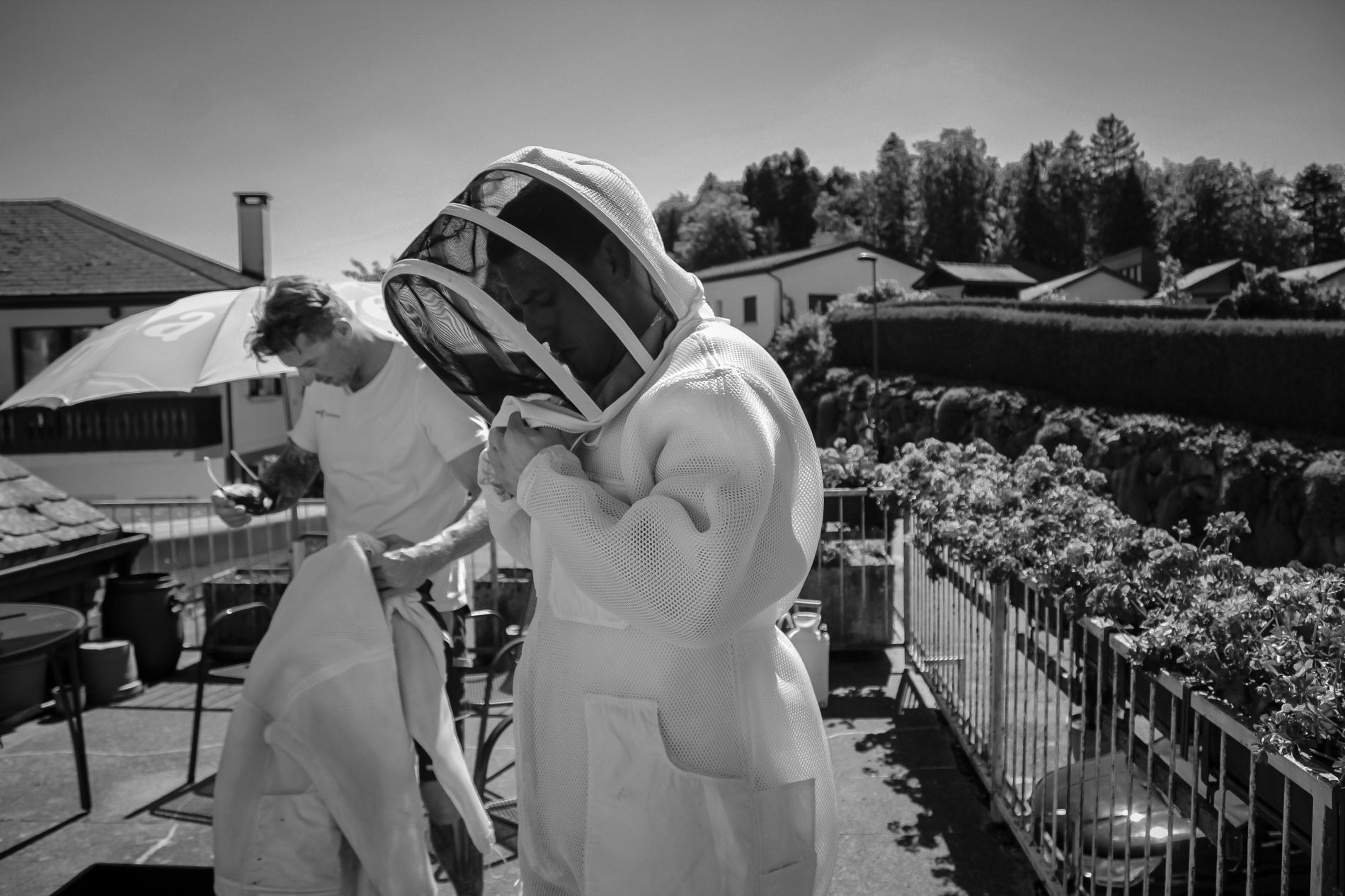
Fighting Asian hornets in Campo (Vallemaggia)
Have you discovered an Asian hornet's nest? We'll be on site quickly! Call now - Daily Mon-Sun 07:00-21:30. Contact us now: 058 510 22 54
Having the Asian hornet's nest removed
Vespa velutina, a type of hornet species originating in South-East Asia, has aggressively expanded its presence to Switzerland and the entire subcontinent through invasive means. While not aggressive towards humans, it is infamous for being a hunter of honey bees, which has caused concern among beekeepers. Just a small group of these hornets can swiftly attack and decimate a colony of bees within a few hours. If you have discovered a hornet's nest on your house, patio, shed, or in your blind box, contact our experts for hornet nest removal in Campo (Vallemaggia)!
Use the uncomplicated telephone service of the Hornet experts in Campo (Vallemaggia) and simply inform us at 058 510 22 54, we will be on site quickly so that you and everyone in your area feel completely safe again.
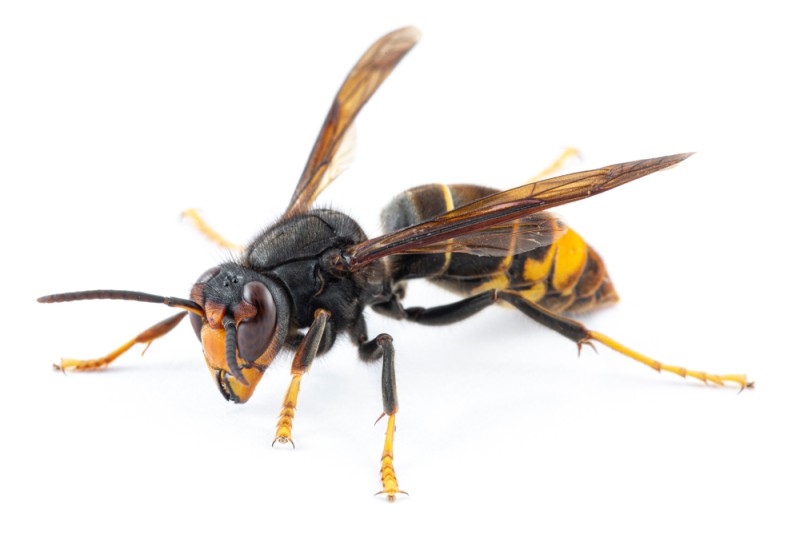

Appearance of the Asian hornet
Here are some characteristics that distinguish the Asian hornet:
1. Size: The queen can reach a length of about 3 cm, while the workers are slightly smaller and measure about 2.5 cm.
2. Color: The Asian hornet has a dark body that is almost black, with a yellow stripe at the back of the abdomen. Its face is orange-yellow.
3. Wings: The wings are dark and almost smoky gray.
4. Legs: The hornet has yellow tips on its legs, which is a striking distinguishing feature when it flies.
5. Nest: The Asian hornet's nest is often high in the trees, but it can also be found underground or in tall structures such as chimneys. It has an oval shape and is made of chewed wood, which gives the hornet a papery texture.
It is important to distinguish the Asian hornet from the European hornet (Vespa crabro), which is more harmless and a natural part of the European fauna. If you suspect you have found an Asian hornet nest near you in Campo (Vallemaggia), you should report this to the local authorities, or using our reporting form, as they can spread quickly and be harmful to bees and other insects. To avoid being attacked by the flying inhabitants, you should hire a professional pest controller such as the Hornet Experts Campo (Vallemaggia). We can identify the nest beyond doubt and take further steps to remove the Asian hornets professionally.
News about the Asian hornet in Campo (Vallemaggia)
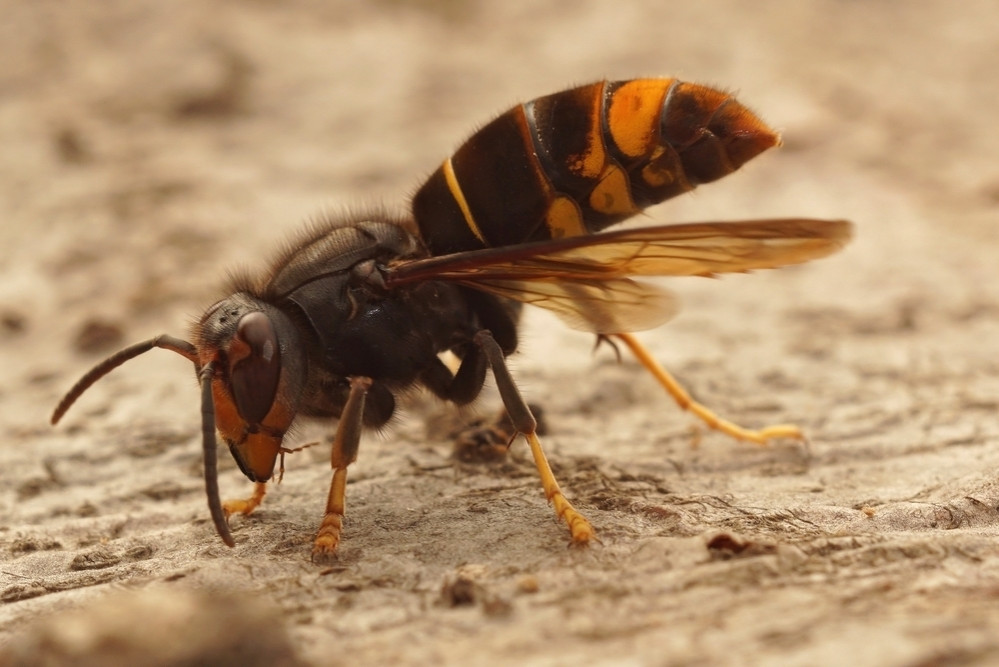
02.12.2025 Western Switzerland: Killer hornet eats bees
The territory of the Asian killer hornet has expanded considerably this year, with a notable increase reported in western Switzerland. This invasive species poses a significant threat to native bee populations, as bees make up the majority of its diet. The potential consequences are serious. Moreover, the hornet represents a danger to individuals with allergies to its venom.
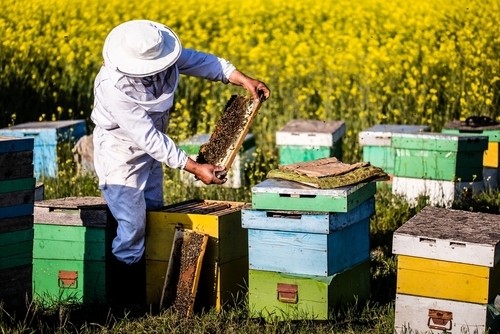
25.11.2025 Serious concerns about the bee population!
Asian hornets are inflicting significant harm on beehives across multiple parts of Europe, as reported by local beekeepers. Even a small number of hornets can destroy an entire bee colony within hours. This sharp decline in pollinators could have serious consequences for pollination, local ecosystems, and agricultural productivity.
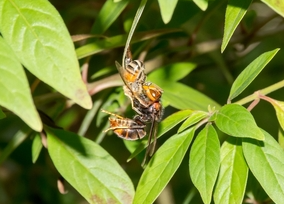
18.11.2025 Asian hornet doesn't just eat bees!
The danger it presents to insects is substantial!
The Asian hornet feeds largely on honeybees—up to 85 percent of its diet—alongside beetles and flies. This high level of predation not only poses difficulties for fruit growers but also further threatens already vulnerable bee populations.
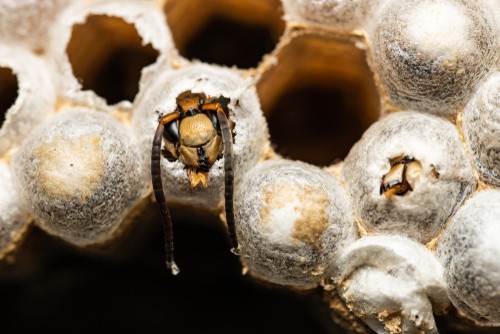
11.11.2025 How did the Asian hornet get to Europe?
The Asian hornet likely arrived in Europe unintentionally and has quickly expanded throughout France and nearby countries. Its adaptability to different environments and the absence of natural predators have contributed to its rapid spread. A single nest can generate several hundred new queens in one breeding season.
Asian Hornet Reporting Form
Please fill out all required fields and submit the form.
Help us!
If you discover an Asian hornet or a nest of this invasive species in Campo (Vallemaggia), it is of the utmost importance that you report it immediately. The Asian hornet is not only dangerous to humans, but also poses a serious threat to native bee populations and the ecological balance in Switzerland.
Why is it important to report the find?
In areas where it has taken root, the Asian hornet profoundly affects indigenous insects, honey bees being particularly vulnerable. Feasting on bees, they contribute to the reduction of pollinators, ultimately impacting local flora and agricultural output. By reporting sightings, experts can react quickly, remove the hornets or their nests and thus prevent the spread of this invasive species.
Notification form for sightings
To effectively control the excessive population of Asian hornets in Switzerland and preserve our native insects, it is crucial for you to report any suspicions or sightings using our dedicated reporting form. Your active participation will enable us to take early action and reduce the proliferation of this harmful species in our ecosystems.
Your contribution is crucial in the fight against the Asian hornet in Campo (Vallemaggia). Together we can protect nature and maintain the balance of our ecosystems;
Thank you for your vigilant attention and your commitment to protecting our environment.
How dangerous is the Asian hornet?
The Asian hornet (Vespa velutina) is a predatory insect that originated in Asia and has spread in recent years to various parts of Europe, including France and now also Switzerland and in Campo (Vallemaggia). Although it poses a threat to honey bees and native biodiversity, it is generally no more dangerous to humans than other wasp species. Nevertheless, there are some aspects to be aware of:
1. Threat to honey bees: The Asian hornet preys on honey bees, threatening native bee populations. A decline in bees can have a negative impact on pollination and thus on local flora and agricultural production.
2. Stings: As with other wasp and hornet species, the stings of the Asian hornet can also be painful. For most people, the stings are unpleasant but not dangerous. However, people who are allergic to wasp or hornet stings can suffer a severe allergic reaction, which in the worst case can lead to anaphylactic shock.
3. Aggressiveness: Although the Asian hornet is not necessarily more aggressive towards humans than other wasp species, it can become aggressive if it feels threatened, especially near its nest.
4. Ecological effects: Apart from the direct effects on honey bees, the spread of the Asian hornet can also disturb the ecological balance by affecting the populations of other insects.
Please bear in mind that the Asian hornet and the Asian giant hornet (*Vespa mandarinia*) are distinct species. It is crucial not to mistake the Asian hornet for the significantly larger Asian giant hornet, which has gained the name "killer hornet". The giant hornet is of greater concern to humans due to the potency of its venom and the size of its sting.
If you have discovered a nest, call us immediately: 058 510 22 54
Our hornet professionals in Campo (Vallemaggia) are certified by the VSS.
Frequently Asked Questions About Asian Hornets in Campo (Vallemaggia)
Considered exceptionally dangerous, the Asian hornet's stings have been known to cause severe harm and even death, placing it well above the level of danger associated with most other hornet species.
Measuring up to a substantial 3 cm in length, the Asian hornet is a formidable stinging insect. Its sleek, dark body showcases a striking arrangement of orange, yellow, and black stripes.
Normally exhibiting reticence and tranquility, the Asian hornet can transition to a highly animated and confrontational state when it feels endangered or trapped. This shift in behavior manifests as increased activity and a heightened aggressiveness in defense.
Humans should be fully aware of the extreme toxicity of the Asian hornet, which can deliver excruciatingly painful bites that may lead to allergic reactions.
The venomous sting of the Asian hornet renders it risky, highlighting its dangerous nature. Its sting is more excruciating compared to other wasps and can potentially cause allergic reactions.
In the case of an Asian hornet discovery, it is essential to report the finding to either a local wild bee protection officer or the relevant department within the Ministry of Agriculture by submitting an official report.
The importance of reporting Asian hornets cannot be overstated, as it contributes to preventing attacks and halting the spread of this insect. Their territorial and aggressive behavior necessitates immediate action.
Mitigating the presence of Asian hornets in Switzerland requires professional hornet control measures. It is advisable to promptly contact a trusted pest control service for assistance.
No specific protections are in place for the Asian hornet; however, it is essential to meticulously track their numbers to avoid their uncontrolled propagation.
As the Asian hornet enters its hibernation phase, it can be found either cohabitating in groups or seeking isolation in the corners of walls, buildings, garden sheds, incidental structures, or tree hollows.
Would you like more information about Asian hornets? Then take a look at our FAQ's about Asian hornets.
Private inquiry form
For an uncomplicated request to remove an Asian hornet's nest, please use our contact form for private individuals.
Real estate inquiry form
Use our property management order form to request the removal of an Asian hornet's nest.
Ecotox GmbH
Partner of: frelon-asiatique-suisse.ch & asiatische-hornisse.ch




_9.jpeg)
_9.jpeg)
_8.jpeg)
_9.jpeg)